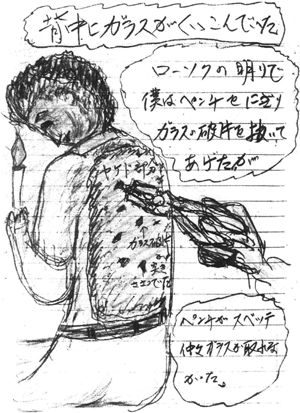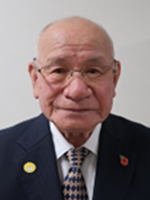August 6, 1945—Atomic Bombing and Black Rain
I was five years and ten months old when the atomic bomb was dropped. I was living in Koiue town which was about 3.5km from the Hypocenter.On the morning of August 6th, I was playing in the stream near my house. Then suddenly something flashed and in a matter of seconds everything became orange before my eyes and I heard a sound like fireworks. After a few more seconds a brown blast of wind from downstream struck me with furious speed. I couldn't stand still and I fell backwards. I remember hearing the noise of the windows of the houses nearby breaking and the sound of the tiles being blown off the roofs and smashing on the ground. I knew that something had just happened but I was little so I kept playing in the stream under the bridge.
I heard my mother shouting. She said, "Masaki, go to the mountain shelter right now. We will go ahead and will be waiting for you!" I got out of the stream and went back to the house in my bare feet. I couldn't go inside because it was too dangerous. There were pieces of broken glass from the front door and from the room windows scattered all over the floor. It was then, for the first time, that I realized something serious had happened.
As I hastily ran to the shelter, I saw the mushroom cloud from the atomic bomb getting bigger and bigger.
After meeting my mom and sister in the shelter, we had to stay still for a long time in the dark and crowded shelter, unable to move. I was very bored. It was then that the radioactive black rain started falling.
Tragic appearance of the A-bomb survivors
Eventually the rain has gotten lighter so we returned home. There were two survivors sitting in the front room littered with shards of glass, and two further people were lying down in the tatami room beyond. As soon as they saw us they all said, "Excuse us, please give us water." My mother and I gave them water right away. They were very grateful and said, "Thank you" to us many times. They were badly burnt. Their faces, hands, chests, legs and hair were all burnt and crinkled. Pieces of skin hung down like string and elsewhere their skin was red and blistered. They looked like they were about to die.One after another, people who were burnt walked past our house. They were bent over and their arms hung a little forward. Their whole bodies were burnt and the skin of their arms was hanging off them like strands of cotton. Their clothes, both their tops and bottoms, were burned and tattered.
When I looked up, the mushroom cloud was even bigger, expanding in the early evening sky. The top half was getting longer and drifting toward Miyajima.
My mother had hurt her face and hand in the blast. That morning, after she had seen my father off to work, she had been putting on makeup in front of the mirror so that she could go out to receive a distribution of rations. It was then that the explosion had happened. Glass, broken by the blast of the atomic bomb, had flown into her. My sister had been near my mother at the time, but fortunately she had only received small cuts.
My father exposed to the A-bombing
That evening at about seven o'clock, when it was a little darker, we heard from a teacher at Koi Elementary School that my father was at the elementary school. My mother got ready and then, taking my sister's hand and my hand, we headed to the school, which was about 500m away. While we were walking down the hill to the school we kept asking "Dad?" to the people who are coming up the road but we couldn't find him.At Koi Elementary School there were many people who were lying down because they were injured and also many people who were looking for members of their family who also hadn't come home. In front of a shelter near the school my mother said to me, "Don't move from here until I come back." She went into the school building still holding my sister.
After a while my mother came back and said, "I couldn't find him so let's go home." I think it was about eight o'clock. As we were walking home we were still asking the people who were sitting on the street and walking by if they were my father but no one was. Thinking back about that moment I wonder how worried my mother must have been.

In the candle light, Pulling out the pieces of glass stuck in my father's back (Author Masaki Hironaka)

In the candle light, Pulling out the pieces of glass stuck in my father's back (Author Masaki Hironaka)
August 7th―The death of my father
When I woke up the next day, August 7th, my mother was giving my father rice porridge and she was talking to him. When I saw him he looked in terrible pain. At about three or four o'clock on, my mother called to me, "Come here and stay with your father because he seems weak and in pain." I was in the corner under the eaves. I heard her but I couldn't go near him. That was because I was embarrassed to cry in front of people even though I was young. Under the eaves I put my head against the pillar and cried because I was very sad. The tears didn't stop. I realized how sad I was to be apart from my father.My mother said, "Father has passed away." I cried even louder. He was thirty nine years old. After a little while, I went near to him. I held his hand and cried with my mother. His face didn't look in pain; it was a gentle face as usual.
Thinking back now, I wonder if he might have said something to me if I had been there with him… I think he would have told me to take care of my mother. Now I have become a grown-up myself, I understand how sad my mother must have been. After cremating him at a cemetery in Koiue, my mother and the two of us, my sister and I, went back to my father's home town of Fukuyama on August 23rd.
There is something I want to ask you
I was only five years and ten months old when it happened but I cannot forget the terrible things in my head because they were so horrible. Even after 77 years, when I talk about my experiences remembering what had happened back then tears come flooding out and I got very sad. However, I have made an effort to get the sorrow and anger out by drawing and writing this story of what my own eyes saw and my own head remembers.Hibakusha have been suffering hardships ever since the atomic bombing. There is an expression, "human lives are heavier than the earth." The worth of human lives is incalculable. It only took an instant to drop the bomb, but tens of thousands of people died because of it. My father was one of them. Although, to the country, he was just one person from the tens of thousands of people, but he was everything for us and for me. He was the pillar of our family. Even if a lot of money is piled up he won't come back. Please everyone; take good care of the lives you have been given by your parents.
Finally there is something I want to ask you as a favor. I wanted you to know about my atomic bomb experience because I don't want anyone else to have a similar experience. And everyone, please study the past and think about the future.
Masaki Hironaka
Born in 1939.
For many years, he has testified about his experience of the atomic bombing both in Japan and overseas. Since 2022, he has been commissioned by the Hiroshima Peace Culture Foundation to serve as a witness to the A-bomb experience.
His motto is "Gratitude for life, live in the present."
For many years, he has testified about his experience of the atomic bombing both in Japan and overseas. Since 2022, he has been commissioned by the Hiroshima Peace Culture Foundation to serve as a witness to the A-bomb experience.
His motto is "Gratitude for life, live in the present."
Hiroshima Peace Culture Foundation
1-2 Nakajima-cho, Naka-ku, Hiroshima 730-0811 JAPAN
Phone 082-241-5246
Copyright © Since April 1, 2004, Hiroshima Peace Culture Foundation. All rights reserved.
